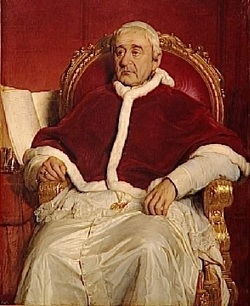
It will not be difficult for you, in such a clear and evident matter, to drive so fatal an error from the midst of the peoples under your care. Indeed, since the Apostle had warned us that “there is but one God, one faith, one baptism” (Eph 4:5), those who believe that all religions offer the means to reach eternal salvation must fear and comprehend that, according to the testimony of the Savior Himself, “those who are not with Christ are against Him” (Luke 11:23); and that they scatter in sadness, since they do not gather with Him. Consequently, there is no doubt that “they who do not profess the Catholic Faith and maintain it whole and inviolate will be eternally lost” …
From this infected source of “indifferentism” flows that absurd and erroneous maxim, or rather this delirium, that it is necessary to grant everyone “freedom of conscience.” This most pernicious error has its way prepared by a full and immoderate freedom of opinion that is widely spread for the ruin of religious and civil society. Some repeat with extreme impudence that it brings an advantage for religion. However, St. Augustine asked: “What could be a worse evil for the soul than the liberty of error?”
Once one removes the restraints that keep men within the path of truth, their nature, which is already inclined to evil, opens to “the bottomless pit,” from which John saw smoke ascending that obscured the sun, and grasshoppers coming forth that devastated the earth. From this comes transformation of souls, profound corruption of youth, contempt for sacred things and the most respectable laws, which is spread among the people. In a word, it is a most deathful scourge for society, since experience shows that the States which shone for their riches, power, and glory perished as a result of this evil, namely, immoderate liberty of opinions, the relaxation of customs, and the love of novelties.
(Gregory XVI, Mirari Vos in
Receuil des Allocution consistoriales,
Encycliques et autres Lettres Apostoliques Citées
in the Encyclical and Syllabus of December 8, 1864
Paris: Adrien Le Clere, 1865, n. 13, p. 163)
 RSS Feed
RSS Feed
